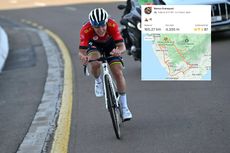The life of a Paralympics tandem pilot
Tandem pilot Helen Scott discusses her experiences on route to silver and bronze medal with Aileen McGlynn at the Paralympic Games in London
- (opens in new tab)
- (opens in new tab)
- (opens in new tab)
- Sign up to our newsletter Newsletter
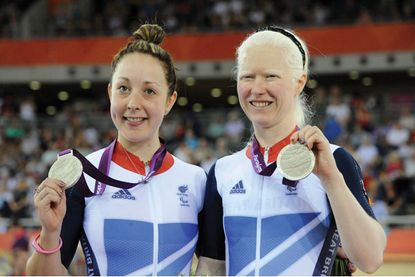
This article was originally published in 2013
Helen Scott is one of the able-bodied competitors at the Paralympic games, piloting Para-cycling legend Aileen McGlynn in the 3km pursuit and kilo.
>>> 2016 Paralympic cycling essential guide and schedule
Scott began her cycling career at the tender age of 10, after being inspired by Chris Hoy and Kelly Holms winning gold in Athens. With encouragement from her parents she joined local Cycling Club Halesowen A&CC, where she now holds lifetime membership. Things took off from there with her obvious potential being seen at National Track Omniums and Championships.
After not quite making it onto the Olympic Development Programme, Scott made a breakthrough at the 2008 National Senior Track Championships during her final year as a junior where she gained silver in the team sprint with Halesowen team mate Jessica Varnish. "I did a good man one in the team sprint and at the time that's what they were looking for, we were up against Vick and Anna Blyth, so it was a solid result. Soon after that I began my degree at Birmingham University, I ended up quitting after just two weeks though.
I received a letter saying I'd made it onto British Cycling's sprint academy, and it was a no brainer really. I thought it'd maybe take another year of getting some more solid results so it was a nice surprise and I went for it". After being selected Scott swiftly moved up to Manchester and began living and training by the national cycling centre with the other academy riders.
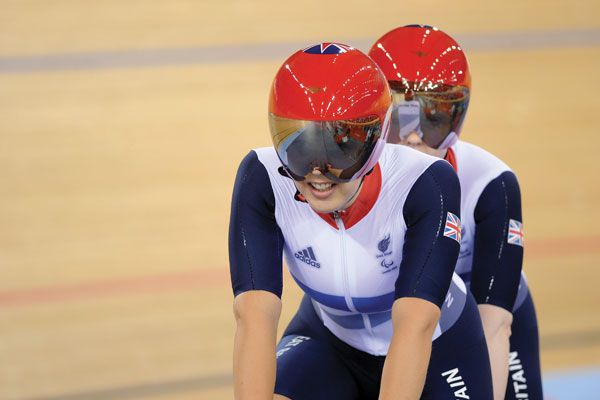
Transfer to Tandem
However Scott explains it was not all plain sailing and after representing GB at world cups and winning the team sprint at the nationals with Varnish in 2009 she was told she had not made the grade. "I had a meeting with my coaches and they explained I had not progressed as well as they'd hoped".
>>> Meet the Paralympic cyclists: Neil Fachie and Pete Mitchell
However her talent on a bike was still very apparent and she was approached by the para-cycling coach Chris Fuber and asked to consider being piloting a tandem. "He gave me his number and said to call him if I was interested."
Initially Scott admits she was adamantly against this, "I wanted to be a match sprinter and ride on my own, but finally I called Chris and decided to give it a go. The first time I got on a tandem was with Neil Fachie as stoker, it felt so natural and normal. I loved it!"
Despite being a natural on the tandem Scott still had to check she made the grade physically "I had to do ramp test to see if she could produce the numbers needed to be a pilot.
After all my sprint training on the academy my endurance for the 3km wasn't there. The Para coaches understood why and gave me a winter training plan, to get my endurance up, lots of longer rides. I was re tested in the New Year and thankfully produced the numbers required. It was a such a switch around from only wanting to ride alone to all my efforts going into getting fit enough to pilot a tandem".
Piloting a Legend
"I still had to get used to riding a tandem so it was natural, so initially I did a lot of my road rides on the tandem. Now Aileen and I are used to each other we can go away and train individually and then come back together when we get on the track. It's just easier for us both as there's so much more effort involved riding a tandem, because the bikes are a lot heavier.
There's two of you and it really puts a strain on your back as a pilot, it can take a lot out of you. I have to get a lot of back massages now. It's funny when people ask me if I find it weird or different on a tandem as I just fell like I'm riding my own bike. It's become so normal to ride with someone behind, I mean I haven't ridden on the track on my own for a good few years now!
"Leading up to the games all the training on the track was together, doing start after start from the gate each time to ensure it became natural. It's just like any event starting from the gate, you need to practise, but it's even more important on the tandem.
You feel every little wobble or movement from the person behind, so you really need to make it becomes natural and you're in sync, but when you do a good start it's awesome and you know you're on for a quick ride."
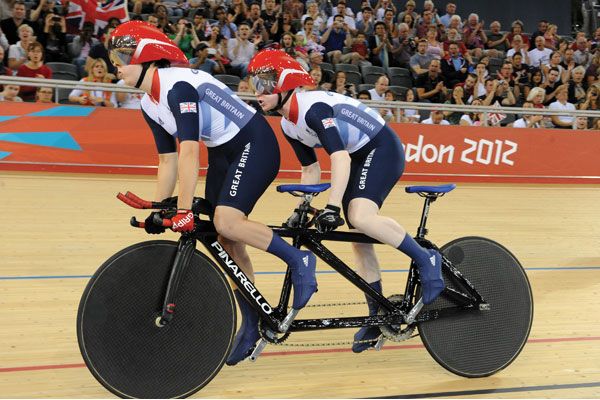
Knowing McGlynn was reining Paralympic champion for both events Scott says how, surprisingly, she didn't feel much pressure. She went to her first games ever in front of a home crowd and decided to enjoy every moment and believes this attitude helped her on the way to the podium "I think maybe Aileen was more nervous than I was, I just got there and thought I'm only going to get to ride a home games once so I'm going to enjoy this, all my family and friends were there watching it was amazing".
Onwards and Upwards
After coming away from her first Paralympics with a bronze and silver medal, in the 3km pursuit and kilo TT respectively, Scott is determined to reach that top spot.
With her sights firmly set on Rio, she knows there is likely to be many changes to the squad in the coming years but with the new up and coming talent set to drive her on.
Scott says how even within tandem riding stiffer competition is meaning more specialisation in either the 3km or kilo events will be needed "you wouldn't see Vicky getting up and winning the kilo and the 3km, so why is expected for tandem riders?
It's unrealistic, they're such different events. Plus there's talk of tandem match sprinting coming back, which I'd love to give a go!" But for now Scott is back in training mode ready for the next goal and with Aileen being Scottish the Commonwealth games may see a new all England pairing for Scott "there's some new girls coming through and it'd be great to ride with them in the future".
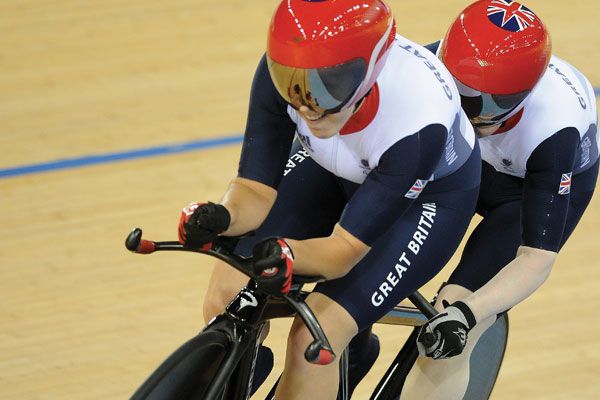
Tandem Riding
The tandem events in Para cycling events have an able bodied Pilot and a stoker that has some degree of visual impairment. The stoker, who sits on the back, provides the power and speed whilst the pilot sits at the front and their main job is to steer.
However pilots must be able to match their stoker in speed and power to ensure they do not slow them down. Tandem pilots were the only able bodied competitors before the 2012 games that could win medals as well.
Tandem trust
"What I haven't done yet is get on the back of a tandem and try that out, it's rather bad as I've got someone putting complete trust in me but I'm not sure if I could do it. One time we were on a training camp and we were out on a road ride on the tandem and coming down the mountain with all these hairpins, I was nailing it.
I felt in complete control, but Aileen had to ask me to slow it down a bit as she wasn't so comfortable. So that's one of this winters tasks to give riding on the back of a tandem a go, so I can really understand what the other person is feeling, hopefully it'll help me progress as a pilot."
This article was first published in the December 20 issue of Cycling Weekly. You can also read our magazines on Zinio and download from the Apple store (opens in new tab).

Thank you for reading 10 articles this month* Join now for unlimited access
Enjoy your first month for just £1 / $1 / €1
*Read 5 free articles per month without a subscription

Join now for unlimited access
Try first month for just £1 / $1 / €1
Founded in 1891, Cycling Weekly and its team of expert journalists brings cyclists in-depth reviews, extensive coverage of both professional and domestic racing, as well as fitness advice and 'brew a cuppa and put your feet up' features. Cycling Weekly serves its audience across a range of platforms, from good old-fashioned print to online journalism, and video.
-
-
 “I haven’t found the ends of my ability yet”: a conversation with the forces behind gravel para-cycling
“I haven’t found the ends of my ability yet”: a conversation with the forces behind gravel para-cyclingPara cyclists Dr. Meg Fisher, Andrew Bernstein and Johanne Albrigtsen discuss inclusion, access and their love for the growing sport of gravel racing
By Emily Schaldach • Published
-
 Remco Evenepoel obliterates Tenerife's Mount Teide Strava KOM
Remco Evenepoel obliterates Tenerife's Mount Teide Strava KOMReigning World Champion currently in altitude training before next week's Volta a Catalunya
By Tom Thewlis • Published

